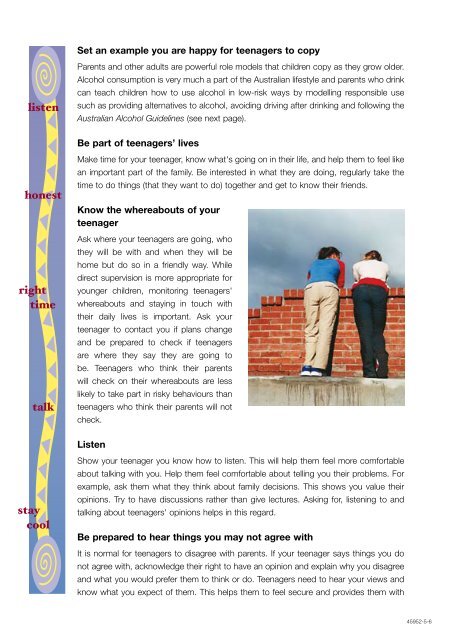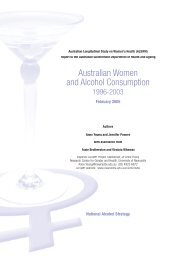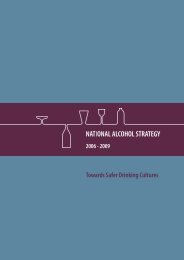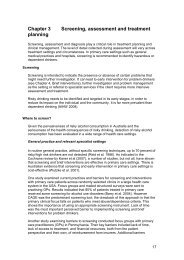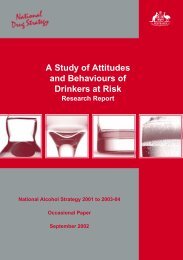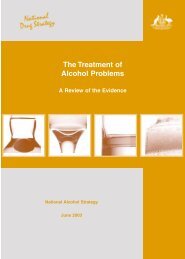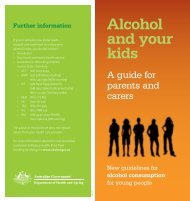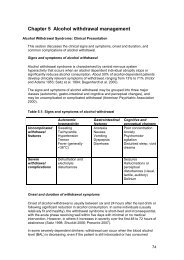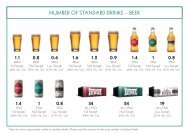Teenagers and Alcohol: A guide for parents
Teenagers and Alcohol: A guide for parents
Teenagers and Alcohol: A guide for parents
Create successful ePaper yourself
Turn your PDF publications into a flip-book with our unique Google optimized e-Paper software.
Set an example you are happy <strong>for</strong> teenagers to copy<br />
listen<br />
Parents <strong>and</strong> other adults are powerful role models that children copy as they grow older.<br />
<strong>Alcohol</strong> consumption is very much a part of the Australian lifestyle <strong>and</strong> <strong>parents</strong> who drink<br />
can teach children how to use alcohol in low-risk ways by modelling responsible use<br />
such as providing alternatives to alcohol, avoiding driving after drinking <strong>and</strong> following the<br />
Australian <strong>Alcohol</strong> Guidelines (see next page).<br />
Be part of teenagers’ lives<br />
honest<br />
right<br />
time<br />
talk<br />
Make time <strong>for</strong> your teenager, know what's going on in their life, <strong>and</strong> help them to feel like<br />
an important part of the family. Be interested in what they are doing, regularly take the<br />
time to do things (that they want to do) together <strong>and</strong> get to know their friends.<br />
Know the whereabouts of your<br />
teenager<br />
Ask where your teenagers are going, who<br />
they will be with <strong>and</strong> when they will be<br />
home but do so in a friendly way. While<br />
direct supervision is more appropriate <strong>for</strong><br />
younger children, monitoring teenagers'<br />
whereabouts <strong>and</strong> staying in touch with<br />
their daily lives is important. Ask your<br />
teenager to contact you if plans change<br />
<strong>and</strong> be prepared to check if teenagers<br />
are where they say they are going to<br />
be. <strong>Teenagers</strong> who think their <strong>parents</strong><br />
will check on their whereabouts are less<br />
likely to take part in risky behaviours than<br />
teenagers who think their <strong>parents</strong> will not<br />
check.<br />
Listen<br />
stay<br />
cool<br />
Show your teenager you know how to listen. This will help them feel more com<strong>for</strong>table<br />
about talking with you. Help them feel com<strong>for</strong>table about telling you their problems. For<br />
example, ask them what they think about family decisions. This shows you value their<br />
opinions. Try to have discussions rather than give lectures. Asking <strong>for</strong>, listening to <strong>and</strong><br />
talking about teenagers' opinions helps in this regard.<br />
Be prepared to hear things you may not agree with<br />
It is normal <strong>for</strong> teenagers to disagree with <strong>parents</strong>. If your teenager says things you do<br />
not agree with, acknowledge their right to have an opinion <strong>and</strong> explain why you disagree<br />
<strong>and</strong> what you would prefer them to think or do. <strong>Teenagers</strong> need to hear your views <strong>and</strong><br />
know what you expect of them. This helps them to feel secure <strong>and</strong> provides them with<br />
45952-5-6


